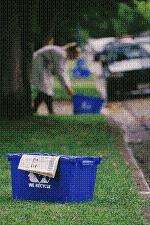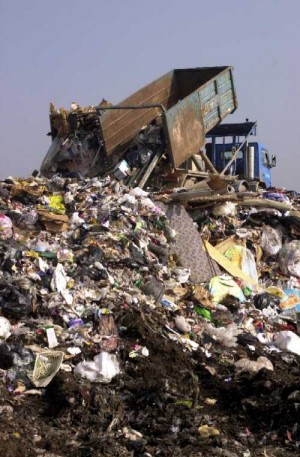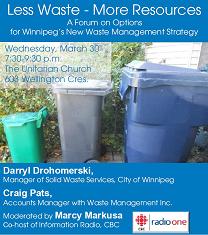 Many of our members and supporters provided us their views on our question this week: is recycling worthwhile?
Many of our members and supporters provided us their views on our question this week: is recycling worthwhile?
I think that recycling is worthwhile. Certainly, we need to improve our recycling systems in Manitoba. One of the biggest problems is that businesses, consumers and municipalities do not pay the full environmental costs of the dumping waste into landfills, so not recycling looks artificially cheap. That is why we promote extended producer responsibility: the people responsible for producing waste have the best ability to take care of the mess they create.
Recyclable item |
Destination |
End use |
| Containers | ||
| Glass | Winnipeg | Road base |
| #1 plastic bottles (PET) | Western Canada | Plastic bottles and trays, carpet fibre |
| #2 plastic bottles (HDPE) | Western and Eastern Canada | Sewage pipe, plastic bottles |
| #3 – #7 plastic containers | Eastern Canada, Winnipeg and China | Plastic lumber |
| Milk / juice cartons | Eastern Canada and Midwestern USA | Office paper and tissue paper |
| Aluminum | Eastern Canada and Eastern USA | Auto parts, aluminum cans |
| Steel cans | Selkirk, MB | Steel building products, auto parts |
| Paper products | ||
| Newspapers, flyers, magazines | Midwestern USA, Eastern and Western Canada | Newspaper |
| Household paper, phone books | Midwestern USA, Western Canada and China | Household paper, boxboard and paper egg cartons |
| Boxboard | Midwestern USA, Western Canada and China | Boxboard and paper egg cartons |
| Cardboard | Midwestern USA | Cardboard |
 One of the biggest incentives for continuing our dumping ways is the low fee for landfill tipping. When Green Action Centre surveyed Manitoba businesses and institutions, one of the biggest barriers to recycling was low tipping fees. They can’t afford to recycle if it is cheaper to take it to the dump. We also do not do enough to support local enterprises that can use our discarded materials here in Manitoba. Once we make the shift from to thinking about waste as resources, our landfills could become engines of sustainable economic growth.
One of the biggest incentives for continuing our dumping ways is the low fee for landfill tipping. When Green Action Centre surveyed Manitoba businesses and institutions, one of the biggest barriers to recycling was low tipping fees. They can’t afford to recycle if it is cheaper to take it to the dump. We also do not do enough to support local enterprises that can use our discarded materials here in Manitoba. Once we make the shift from to thinking about waste as resources, our landfills could become engines of sustainable economic growth.
At present only some of what we recycle is of unambiguous environmental and economic benefit. For things like newsprint and aluminum cans, the value of recycled product pays for itself. For others, like many of our mixed plastics, there are few local markets and many of the materials are shipped overseas. The above chart, from the City of Winnipeg, shows where recyclables end up being processed.
| CO2 of shipping | CO2 saved by recycling | |
| Rail | Sea | |
| 167 kg* | 204kg** | 400 kg+ |
| * 75 g/km-tonne at 2232 km (Winnipeg to Vancouver) |
||
| ** 20 g/km-tonne at 10222 km (Vancouver to Guangzhou) |
||
| + 40% reduction | 1000 kg of CO2 per 1000 kg of plastic |
|
Many of the mixed plastics are sent to China and down-cycled into lower quality materials like plastic lumber. Overall, this is still of some environmental benefit. Shipping one tonne of plastic from Winnipeg to Vancouver by rail creates 167 kilograms of CO2. Shipping it by sea to China adds another 200 kilograms of greenhouse gases, for a total of less than half a tonne per tonne of recycled material. Using recycled plastic to make new plastic saves about an equal amount of CO2, so in terms of greenhouse gases alone, recycling breaks even. Recycling, does however, have the added benefit that it means that we do not have to dispose of ever growing quantities of materials that never completely breakdown.
All this suggests that reducing and reusing are the better options for many of the materials that we currently throw out. Green Action Centre has a special place in our heart and on our website for “R-words”. We suggest that beyond the three Rs, there are some other concepts that can be helpful for getting us to think creatively about reducing the resources required by our material culture. One key term is “re-design”. One of the best ways that we can reduce the mountains of difficult to recycle mixed plastics that we currently ship to China is to stop using mixed plastics. We have the  technology; we just need to give the companies that produce packaging the incentive to adopt more sustainable alternatives. Manitoba’s Stewardship plans are a good start, but clearly we still have a lot of work to do.
technology; we just need to give the companies that produce packaging the incentive to adopt more sustainable alternatives. Manitoba’s Stewardship plans are a good start, but clearly we still have a lot of work to do.
One place to start is to get your voice heard in Winnipeg’s conversation on waste minimization. Come to the public forum on March 30, or attend one of the other City sponsored events.
Find out about more green myths and help us solve them.



This particular webpage “Green Myths: Is recycling worth it? – Green Action Centre” is interesting on https://greenactioncentre.ca. I have been fighting small water leaks within my roof and figured out the issue upon talking to Tiffin today. They advised that the recommended sealant is actually the silicone self …
In order to get a more complete picture of “is recycling worthwhile”, wouldn’t we need a financial cost breakdown as well?